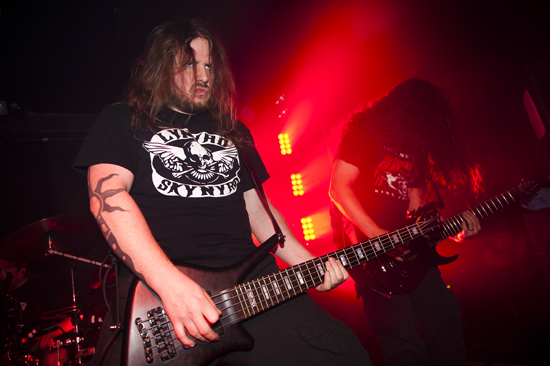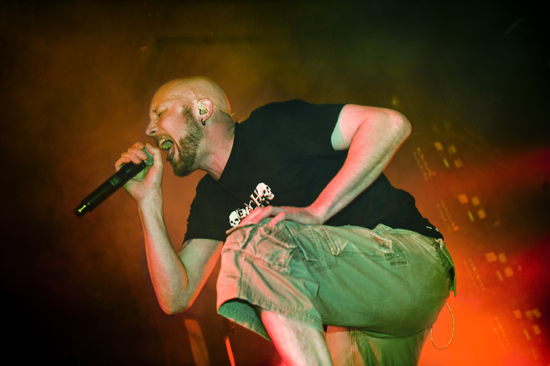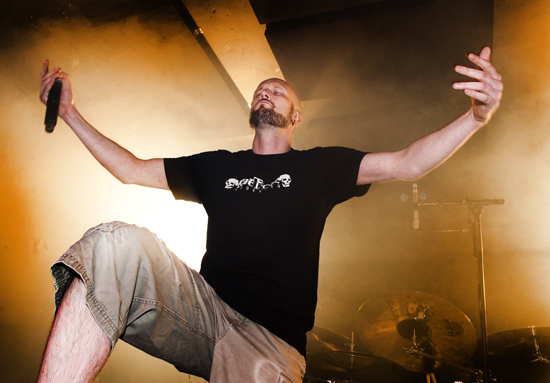In the last twenty years, two Swedish bands have significantly altered the course of modern metal, and more specifically, modern American metal. In the early 2000’s Nu-Metal was in its death throes, and bands like Boston’s Killswitch Engage reintroduced a traditional approach with a modern twist: relentless riffing with a melodic edge that many have attributed to Swedes At The Gates’s seminal record, Slaughter of the Soul.
Fast forward another ten years, and it is happening again. Sweden’s Meshuggah are one of the most important metal bands of the last twenty years: they have pioneered a sound that owes its roots to industrial and extreme metal, but has grown to be something in and of itself. Traditional musical structures do not apply. They have had an indelible impact upon the modern scene, with their punishing, off-kilter rhythms and signature guitar tone popping up all over the bloody place, primarily within the ‘Deathcore’ subgenre, by a glut of bands who, as the title suggests combine the technicality of death metal with the blunt force and bravado of hardcore. Despite Meshuggah’s imprint upon the sound of these bands, they are a largely homogeneous bunch who cannot seem to help but sound alike in their slavish adherence to the verse-chorus-verse-predictable breakdown structure; thus entirely missing the point of Meshuggah’s modus operandi.
If Meshuggah weren’t content with that level of adoration alone, their sound is entirely responsible for another recent addition to the now ridiculously long list of heavy metal sub genres. ‘Djent’, a term coined in specific reference to their trademark sound. The bands involved combine many of Meshuggah’s hallmarks in a more ‘radio friendly’ manner that at times sounds over-produced and somewhat lacking in sincerity. Two of the sub-genre’s prime exponents, Periphery and Tesseract, have thus far created records of sufficient musical virtuosity, with a catchy riff or ten thrown in there for good measure. It satisfies the head, but is somewhat lacking in heart; or as may be more apt for the metal scene – balls. Still, that hasn’t seemed to dissuade the amount of people sporting their t-shirts this evening.
Tonight’s openers Animals as Leaders are the brain child of virtuoso guitarist Tosin Abasi. They have also been lumped in with the Djent scene, and it is easy to see why, with the Meshuggah guitar tone evident in their heavier passages. This entirely instrumental band have greater depth than their peers and Abasi is a musician brimming with potential. He recently released Lingua Franca, an album with his side project T.R.A.M., a mind melting fusion record featuring members of the Mars Volta and Suicidal Tendencies. With Animals As Leaders, Abasi has succeeded in creating two albums that combine metallic clout with an ethereal element of progressive beauty akin to that of Paul Masvidal and his legendary band Cynic.
They begin the set with ‘Wave of Babies’, and are met with loud cheers from an enthusiastic crowd seemingly familiar with their material. For those that may not be so familiar, they waste no time impressing. The vocal gap is more than filled by Tosin Abasi’s scintillating lead playing. The material aired leans heavily on the side of recent second album Weightless, which packs more of a punch then their self-titled début, but lacks some of the light and shade textures that made that record so special. Nevertheless, they go down a storm, and prove that instrumental noodling can be captivating when delivered with the focus and talent that Abasi has in bounds. The man is undoubtedly a star on the rise. He leaves the stage with a wide grin, but not before informing everyone of his opinion that Meshuggah are "the heaviest band, ever."
That is a hotly contested subject, but the ensuing maelstrom that pile-drives the Academy would count as valuable evidence in their favour. Their performance is nothing short of a master-class in extreme metal. Opening with ‘Demiurge’ from recently released seventh album Koloss, they proceed to satisfy their audience with a greatest hits set that only touches lightly upon the new material, instead opting for a crowd pleasing set containing all their greatest moments – ‘New Millennium Cyanide Christ’? Check. ‘Rational Gaze’? Check. Face-melters like ‘Pravus’ and ‘Bleed’ from previous album Obzen sound positively accessible alongside the plodding impenetrability of ‘Break Those Bones Whose Sinew Gave it Motion’ from Koloss, a record as yet obstinately refusing to reveal all of its hidden depths.

The band have toured with the same road crew for the majority of their career, and it shows. Every detail has been thought about. They cut iconic shadowy figures on a backlit stage, bedecked in banners that make it seem like HR Giger’s haunted chapel. When the music reaches its most punishing, the lighting follows suit, a stark white glare as intense as the sonic battery, which as it subsides so the light fades to more sombre reds and oranges; an eerie murmur. Most importantly, every dimension of their sound is precisely defined, and all the more powerful for it.

It is at the midpoint of the set that it becomes truly special. The band disappear from the stage as the academy is bathed in the staccato flash of sickly green light, in tune with the synthesised vocal refrain of ‘Mind’s Mirrors’, from their 2005 record Catch ThirtyThree; a 47 minute long ‘track’ broken into 13 sections. ‘Minds Mirrors’ draws to its eerie-single note picking close, as the band return to the stage and stand, motionless, as the tension mounts with following section ‘In Death – Is Life’s’ tortured, atonal guitar. Everyone familiar with the album waits in nervous anticipation for following track ‘In Death – Is Death’, and as its opening staccato riff explodes from the PA it is a truly thunderous, exultant moment. Every head in the place, from onstage to the back of the room, bangs.

Finishing with a rousing encore of ‘Future Breed Machine’ and ‘Dancers to a Discordant System’ Meshuggah make it patently obvious that they remain peerless… while patiently waiting for everyone else to catch up.



